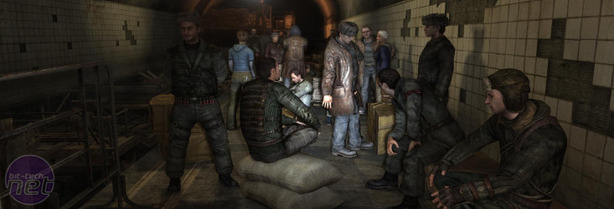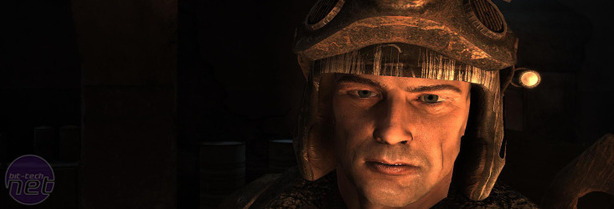
Metro 2033 Review
Publisher: THQPlatform: PC, Xbox 360
UK Price (as reviewed): £24.99 (incl. VAT)
US Price (as reviewed): $48.99 (excl. Tax)
It’s only natural that there should be comparisons drawn between GSC GameWorld’s STALKER and 4A Game’s Metro 2033 – 4A is founded by ex-GSC staff, after all and both games draw from Russian sci-fi for inspiration and post-nuclear communities. While STALKER focuses on Chernobyl though, Metro 2033 is concerned with survivors in the metro tunnels under Moscow.
Despite the similarities though, the two games aren’t actually all that similar. If you’re an avowed STALKER fan and you’re coming to Metro 2033 in the hopes of getting a fix in the same vein then you might be sorely disappointed. Likenesses occur only at the most general of levels and it’s not as simple as labelling one game as outright better than the other.
That said, when playing Metro 2033 it’s clear that the former-GSC developers have paid attention to and learned from STALKER’s faults. The bad news is that that doesn’t stop it from making brand new errors of its own.
So, what does Metro 2033 get right? Well, first and foremost there’s the story and the way that the player is eased into the action through a gentle, but suitably dramatic introductory sequence. That alone is a far cry from STALKER’s poor translation and general confusion. Admittedly, the voice acting is still just as gravelly and terrible, but you’re at least able to keep a good grip on the plot throughout your subterranean escapade.
The story itself is a fairly direct and seemingly well-suited piece of fiction too, with players cast as an inhabitant of the Moscow metro tunnels that shelter the despondent remains of humanity from nuclear winter. The metro tunnels aren’t an easy home. Stations are overpopulated, wracked with poverty and under the constant threat of starvation or attack from mutants. One of Metro 2033’s earliest successes is capturing the expected claustrophobia and making the world around you feel like it’s only one meal away from expiration. You learn to value every resource you have long before the game actually requires it of you just because of how well the game communicates this.
Your job at the start of the game seems a simple one – to ferry a message from your home station to a distant friend on another line, but the quest is complicated by the irradiated, mutant filled tunnels and the volatile cultures between you and your goal. Each station has become a microcosm of a cultural ideal and humanity’s diminished numbers haven’t prevented wars from being fought. The Communists battle openly with the Nazis, while other stations have degenerated into total lawlessness and anarchy. It’s a dangerous world down there.
Metro 2033 admittedly doesn’t spend as much time exploring these small societies as the book it’s based upon, which is a shame. As far as most players will be concerned the main difference between the Communists and bandits is just the colour of the uniform. Attentive gamers though will notice there are a plenty of tiny clues that hint beyond that – overheard conversations and the attitudes of your allies convey a deeper divide.
Unfortunately though, while Metro 2033’s story wins through on these larger themes, the moment-to-moment script is as undernourished as the populace it portrays. Characters you’ve never heard of before appear out of nowhere and help you for no reason, apparently assigning dire significance to your mission without you ever telling them about it. Cracks in the economy filter through too, so that while it’s easy to understand and appreciate the scope of the adventure, the actual immersion is an early casualty.
It’s worth pointing out that the games eagerness to associate itself with Glukhovsky’s novel often further shatters the illusion. Practically every poster or flyer you see in the game is an emblazoned advert for the book, creating the impression that 4A Games feels a desperate need to snatch credibility from the original author. It’s actually a little embarrassing.

MSI MPG Velox 100R Chassis Review
October 14 2021 | 15:04











Want to comment? Please log in.